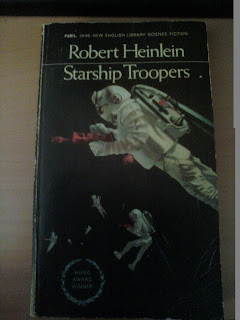The novel started off very strangely. It started with a battle scene that seemed to be all about the specification of weapons the guy was using, rather than the battle itself. In sense, it didn't seem, or feel like a battle scene. That's not a bad thing. Quite original I thought. It covered what it meant to be in the Mobile Infantry and the guy's identity. This would later sum of the book.
Battle scenes weren't something I was looking forward to in the book at all after that. There was no characterisation; there was nothing you would expect to find in a novel that'd make a half decent one. Even a sf novel. My premonition from the start was that the book was going to suffer in parts. That was eventually its downfall.
This book is more of a political essay with some sort of libertarian(?) philosophy. Most of the interesting parts happen in classroom, and talking to instructors and what not, whether that be at the guy's school or in the army. The rest of the story is pretty awful to be honest; mainly filler to make it a novel.
"Through Rico's [the protagonist] eyes, Heinlein examines moral and philosophical aspects of suffrage, civic virtue, the necessities of war and capital punishment, and the nature of juvenile delinquency [via the teacher in the classroom, mainly]."
As a political/philosophical essay this actually interested me, and kept me reading it for a while (magnifying glass was probably needed..). As a novel it's non-existent, which is why I didn't finish it. May as well of just read the political conversations online rather than read an old 70's paperback version of it. Font is 6pt in that book...
Fun fact: Starship Troopers is on the reading lists of four out of five of the United States military academies, as well as the official reading lists of the United States Army and the United States Marine Corps.
Here's my version. The quotes at the start of the chapters are also really cool:
"My mother said violence never solves anything." "So?" Mr. Dubois looked at her bleakly. "I'm sure the city fathers of Carthage would be glad to know that."
- Exchange between Mr. Dubois, a teacher, and a student in a classroom scene

No comments:
Post a Comment